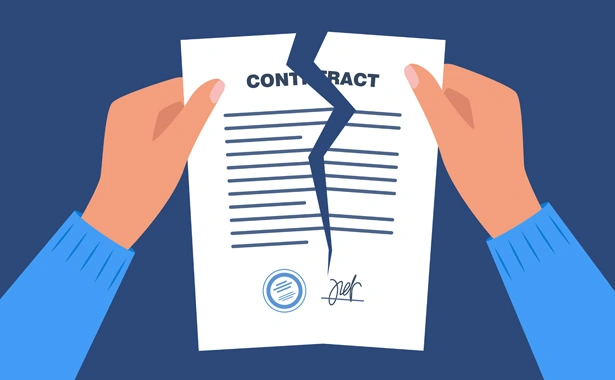Contents
Agreement cancellation involves the formal termination of a contract between parties for reasons that can include mutual consent, breach of terms, or external factors such as force majeure. The process typically involves notifying the other party, negotiating exit terms, and formalizing the termination through a Cancellation Agreement that outlines the termination terms and releases parties from obligations. Properly managing this process is crucial to legally conclude obligations and address any subsequent responsibilities or negotiations under new terms.
What is Agreement Cancellation?
Agreement cancellation refers to the process by which a contract or agreement between parties is formally terminated. This can occur for various reasons, such as mutual consent, a breach of terms by one of the parties, or external circumstances that make the fulfillment of the agreement impossible or impractical. Cancellation can be voluntary and mutually agreed upon, or it can be unilateral if one party decides to terminate the agreement due to breach or dissatisfaction. In either case, the goal is to legally conclude the obligations and potentially pave the way for future negotiations or agreements under new terms.
When an agreement is canceled, the process usually unfolds in several well-defined steps, each critical for legally and effectively ending the contractual relationship:
- Notification of Intent to Cancel: The first step involves one party notifying the other of their intention to cancel the agreement. This notification must adhere to the terms specified in the original contract regarding how and when such notice should be given. The notice period allows both parties to prepare for the termination of the agreement and to manage the transition smoothly.
- Negotiation of Exit Terms: After the initial notification, the next step often involves negotiating the terms of exit. This phase depends on the original agreement’s terms and the circumstances surrounding the cancellation. During negotiations, parties may discuss and agree on settlements, compensations, or the handling of ongoing responsibilities. This is crucial to ensure that all parties feel that the termination conditions are fair and equitable.
- Formalization through a Cancellation Agreement: Once the exit terms are agreed upon, the cancellation is formalized through a legal document, often called a Cancellation Agreement. This document outlines all the terms of termination, including any releases from obligations, financial settlements, and other pertinent details. It serves as a legally binding agreement that specifies exactly what each party is responsible for during and after the termination process.
- Fulfillment of Final Obligations: The next step involves the fulfillment of any final obligations that were agreed upon in the Cancellation Agreement. This could include financial settlements, the return of property, or the completion of certain services. Fulfilling these obligations is essential for the dissolution of the contract and can prevent legal disputes later on.
- Discharge from Further Obligations: Finally, once all agreed terms are met and all final obligations are fulfilled, both parties are legally discharged from any further obligations under the canceled agreement. However, it is important to note that some obligations, such as confidentiality clauses or non-compete agreements, may be intended to survive the cancellation. These surviving terms must continue to be respected by both parties even after the contract has ended.
Reasons for Contract Cancellation
There are several reasons why contracts might be canceled, and these can vary depending on the nature of the agreement, the industries involved, and the specific terms outlined within the contract. Here are some common reasons for contract cancellation:
Breach of Contract: This is one of the most straightforward grounds for cancellation. If one party fails to meet their obligations as specified in the agreement, the other party may have legal grounds to terminate the contract. Breaches can be minor or material, but typically, material breaches—which significantly affect the value of the contract—provide sufficient grounds for cancellation.
Mutual Agreement: Contracts can be canceled if both parties agree to terminate the agreement mutually. This might occur when the contract no longer serves the interests of either party, or external circumstances have changed making the contract less beneficial or unnecessary.
Impossibility of Performance: This legal concept, also known as “force majeure,” refers to situations where unforeseen events (such as natural disasters, war, or changes in laws) make it impossible for one or both parties to fulfill their contractual duties. Contracts often include specific force majeure clauses that address potential scenarios and their impact on the agreement.
Frustration of Purpose: Similar to impossibility, frustration occurs when the underlying reason for entering into the contract no longer exists due to unforeseen events. This makes the fulfillment of the contract pointless even if performance is still technically possible.
Illegal or Unethical Terms: If a contract involves terms that are found to be illegal or that become illegal due to changes in law, the contract can be canceled. Similarly, if continuing with the contract would require one or both parties to engage in unethical or illegal activities, this would also provide grounds for cancellation.
Expiration of Terms: Many contracts have a set duration and simply end once that period expires, unless renewed. This natural conclusion of an agreement does not require a formal cancellation but is a type of termination.
Cooling-Off Period: Some contracts include a cooling-off period during which one party can reconsider and cancel the contract without penalties.
Rescission: This can occur if there was a mutual mistake regarding a fundamental fact at the time the contract was formed, or if there was misrepresentation or fraud involved in the agreement’s inception. Rescission voids the contract and attempts to restore both parties to their original state as if the contract had never been formed.
Condition Subsequent: Some contracts contain specific conditions that, if met, automatically end the contract or allow for its cancellation. These conditions must be clearly stated in the contract and understood by all parties involved.
Understanding these grounds is crucial for managing contractual relationships and may require legal expertise, particularly when disputes arise or when the stakes of contract termination are high. This knowledge helps parties navigate their rights and obligations effectively, minimizing risks and legal conflicts.
Contract Cancellation Policy
A contract cancellation policy outlines the terms under which a contract may be terminated before its scheduled end date. This policy is crucial for managing the expectations and responsibilities of both parties involved in the contract. Here are typical elements included in a contract cancellation policy:
- Notice Period: Specifies the amount of notice required to terminate the contract, usually given in days or months. For example, many service contracts require 30 days’ notice for cancellation.
- Cancellation Fee: Some contracts include a fee for early termination. This fee can vary depending on the nature of the contract and how much of the contract term remains.
- Refund Policy: Details any conditions under which refunds may be given for prepaid services or products. This might include prorated refunds based on the amount of service used versus the amount of time remaining in the contract.
- Method of Cancellation: Describes the accepted methods for delivering a cancellation notice, such as via certified mail, email, or through a specific online portal.
- Special Clauses: Includes any specific conditions that might allow for penalty-free cancellation, such as breach of contract by the other party, or external circumstances like new laws that render the terms of the contract unfeasible.
- Renewal Terms: Often, contracts automatically renew unless canceled within a specific timeframe. The policy should specify how and when to notify about non-renewal.
- Dispute Resolution: Outlines the process for handling disputes related to the cancellation, possibly including arbitration or mediation as first steps before legal actions.
When creating or agreeing to a contract, it is important to thoroughly understand the cancellation policy to avoid unexpected obligations or expenses. If you are drafting a policy or need to understand one better, making it clear, precise, and fair can help prevent conflicts and ensure both parties are treated fairly.
Consequences of Failing to Legally Cancel a Contract
Failing to legally cancel a contract in accordance with legal protocols can lead to a variety of adverse consequences, including continued obligations and financial penalties. Other risks include legal disputes, litigation, loss of rights, and damage to business relationships.
Continued Obligations: If a contract is not legally terminated, parties may remain bound by its terms, which means they are still obligated to fulfill any duties stipulated by the agreement. This can result in unintended expenses or liabilities.
Legal Disputes and Litigation: Improper termination can lead to disputes between parties, often resulting in litigation. This can be costly, time-consuming, and damaging to reputations.
Financial Penalties: Many contracts include clauses that impose penalties for breach or improper termination. Failing to terminate a contract legally can trigger these penalties, leading to significant financial costs.
Loss of Rights: Termination must often be executed in a specific manner to preserve certain rights, such as the right to seek damages or other legal remedies. Improper termination can result in the forfeiture of these rights.
Damage to Business Relationships: The failure to properly handle contract termination can damage business relationships, affecting future opportunities and collaboration.
Differences between a Cancellation Agreement and a Termination Agreement
Cancellation Agreement
This type of agreement is generally used when parties decide to void or cancel a contract before its completion or before any major obligations have been fulfilled. It might be used in cases where unforeseen circumstances prevent the execution of the contract or where both parties agree that continuing is not in their best interest. A cancellation agreement often acts as if the contract never existed. It might involve terms for unwinding any action already taken under the contract, but it primarily aims to restore parties to their original state before the contract, to the extent possible. Considerations of such an agreement might include clauses related to the reimbursement of costs incurred, confidentiality provisions, and possibly a release clause to prevent future claims related to the contract.
Termination Agreement
Termination agreements are used to formally end a contract that is currently in effect and may have been partially or fully performed by the parties. Such agreements are common when the contractual relationship is no longer beneficial or is untenable due to various factors, including performance issues, breach of terms, or mutual agreement to cease operations. The termination of a contract through such an agreement acknowledges that the contract was valid until the termination point. It generally deals with the conclusion of obligations, handling of existing liabilities, and the terms under which the parties agree to part ways. Considerations could encompass final payments, settlement of disputes, handling of remaining contractual duties, and clauses detailing any ongoing responsibilities such as warranties or indemnifications.
Both types of agreements typically involve detailed terms that govern the end of the contract and handle any loose ends. The choice between a cancellation and a termination agreement depends on the specific circumstances surrounding the end of the contract, including whether the contract needs to be considered as having existed with ongoing effects after its conclusion.
Consequences of Cancellation Agreement and Termination Agreement
The consequences of a cancellation agreement and a termination agreement can vary significantly based on the terms negotiated within those agreements and the context in which they are used.
- Cancellation Agreement Consequences
Nullification of the Contract: The primary consequence of a cancellation agreement is that it treats the contract as though it never existed. This can be crucial for avoiding future liabilities or obligations that would have arisen under the contract.
Financial Adjustments: The agreement may require one or both parties to return funds or assets exchanged or to make payments meant to restore parties to their original financial state as much as possible.
Release of Obligations: Both parties are typically released from their obligations under the contract, which means neither party is required to fulfill any outstanding terms of the original agreement.
Confidentiality and Non-Disclosure: The cancellation might still require parties to adhere to confidentiality agreements that were part of the original contract, especially if sensitive information was exchanged.
Dispute Resolution: Cancellation agreements can include provisions for handling any disputes that arose under the original contract or as a result of the cancellation process.
- Termination Agreement Consequences
Acknowledgment of Prior Validity: Unlike a cancellation agreement, a termination agreement recognizes that the contract was valid up until termination, which means some legal consequences of past actions under the contract may still be relevant.
Completion of Outstanding Obligations: The agreement may stipulate how the remaining obligations under the contract are to be handled, possibly including the final delivery of goods or services, final payments, or penalties.
Settlement of Disputes: If there were any breaches or disputes, the termination agreement might include terms for resolving these issues, potentially involving compensation or other remedies.
Future Restrictions: Termination agreements can impose future restrictions on the parties, such as non-compete or non-solicitation clauses, depending on the nature of the contract and the relationship between the parties.
Ongoing Responsibilities: Certain obligations may survive the termination of the contract, such as warranties, indemnities, and the protection of intellectual property.
Standard Clauses in Cancellation Agreements
Standard clauses in cancellation agreements typically include the following key components:
Recitals: This section explains the context of the original agreement and the reasons for its cancellation. It often includes a brief description of the intentions of both parties when entering into the original contract.
Cancellation Clause: The core provision that formally declares the mutual agreement of the parties to cancel the contract. This clause specifies that the contract is to be treated as if it had never been effective.
Financial Settlements: Details any financial obligations or settlements that are due as a result of the cancellation, such as refunds, compensations, or any outstanding payments.
Release of Liability: This clause absolves both parties from further obligations under the contract, ensuring that neither party can hold the other liable for future claims related to the contract.
Confidentiality: Often, the agreement will maintain any confidentiality clauses that were part of the original agreement, ensuring that any private or sensitive information remains secure even after the contract is canceled.
Return of Property: If applicable, this section mandates the return of any physical or intellectual property exchanged during the term of the contract.
Dispute Resolution: Specifies the methods by which any disputes arising from the cancellation of the contract will be resolved, whether through arbitration, mediation, or court proceedings.
Miscellaneous: This catch-all section can include various additional terms, such as the governing law, the effect of the cancellation on other agreements between the parties, and any other legal considerations necessary to ensure a comprehensive agreement.
Signatures: Finally, the agreement concludes with the signatures of authorized representatives from both parties, officially validating the document.
These clauses are designed to ensure that all aspects of the contract’s cancellation are clearly defined and agreed upon, reducing the likelihood of future conflicts.
Reasons to Exclude a Non-disparagement Clause from Your Cancellation Agreement
When drafting a cancellation agreement, you might choose to exclude a non-disparagement clause for several reasons:
Not including a non-disparagement clause allows parties more freedom in how they communicate about the cancellation and their experiences within the contract. This can be particularly relevant in industries where transparency about business experiences is valued. Non-disparagement clauses can sometimes complicate negotiations, as parties may disagree on the terms and scope of what constitutes disparagement. Omitting this clause can simplify the agreement process.
Depending on the jurisdiction, non-disparagement clauses can raise legal challenges, particularly if they are seen as too broad or infringing on free speech rights. Not having such a clause can avoid potential legal disputes down the line. For some organizations, avoiding restrictive clauses like non-disparagement can align better with a culture of openness and may be seen positively by others, suggesting confidence in their business practices and respect for free expression.
Excluding a non-disparagement clause does not mean that parties are encouraged to speak negatively about one another; rather, it acknowledges that the freedom to share truthful information is not legally restricted by the cancellation agreement. This approach can help maintain honest business relations and trust among the parties involved.
Cancellation Agreement Sample
This Cancellation Agreement (the “Agreement”) is made and entered into as of [Date], by and between [Party 1 Name], with an address at [Party 1 Address] (the “First Party”), and [Party 2 Name], with an address at [Party 2 Address] (the “Second Party”).
Recitals
WHEREAS, the First Party and the Second Party entered into a [Original Agreement Name], dated [Original Agreement Date], related to [describe the nature of the original agreement, e.g., the provision of services, sale of goods, partnership, etc.];
WHEREAS, the Parties wish to terminate the said Agreement;
NOW, THEREFORE, in consideration of the mutual covenants and promises herein contained, the parties hereto agree as follows:
- Termination
- The Parties hereby agree that the [Original Agreement Name] dated [Original Agreement Date] is terminated effective [Termination Date].
- Release and Waiver
- Each Party releases the other from all liabilities, claims, and obligations further or related to the [Original Agreement Name]. Each Party further waives all rights they may have under the terms of the said Agreement.
- Confidentiality
- The Parties agree to maintain the confidentiality of the terms of this Agreement and the circumstances surrounding its execution unless disclosure is required by law.
- Return of Property
- If applicable, each Party agrees to return any property belonging to the other Party that was in their possession due to the [Original Agreement Name] by no later than [Return Date].
- Final Settlement
- The Parties acknowledge that any payments, returns, or other settlements made pursuant to this Agreement represent the full and final settlement of any obligations under the [Original Agreement Name].
- Miscellaneous
- This Agreement constitutes the entire agreement between the Parties regarding its subject matter and supersedes all prior agreements and understandings, both written and oral, between the Parties with respect to its subject matter.
- This Agreement may only be amended, modified, or supplemented by an agreement in writing signed by each Party hereto.
IN WITNESS WHEREOF, the Parties hereto have executed this Cancellation Agreement as of the date first above written.
[Signature Page Follows] [Party 1 Name] ___________________________ [Party 2 Name] ___________________________How to Successfully Cancel a Contract?
Effectively canceling a contract requires careful consideration of the legal and practical implications.
- Review the Contract: Start by thoroughly reviewing the original contract to understand the terms and conditions related to cancellation. Look for any specific clauses that outline the procedure for termination, including any required notice period and the acceptable methods of delivering that notice.
- Check for Breach: Before proceeding, determine whether there has been a breach of contract by either party. If a breach has occurred, this might provide a legal basis for termination.
- Consider the Consequences: Understand the consequences of contract termination as outlined in the contract. This can include penalties, return of goods, confidentiality obligations, or final settlements. Assess whether the benefits of cancellation outweigh these potential costs.
- Seek Legal Advice: If the contract is complex or involves significant obligations or penalties, it might be wise to consult with a lawyer. This is especially important if the other party disputes your right to cancel.
- Negotiate with the Other Party: Sometimes, the best way to cancel a contract is through mutual agreement. If possible, negotiate with the other party to reach a mutually agreeable termination agreement. This can often result in a more amicable resolution and may include terms that are favorable to both parties.
- Provide Written Notice: If you decide to proceed with cancellation, send a formal notice of termination to the other party according to the method prescribed in the contract (e.g., via certified mail). The notice should clearly state your intention to cancel the contract, the reason for cancellation (if applicable), and reference the specific contract terms that allow for cancellation.
- Document Everything: Keep a detailed record of all communications and documents related to the cancellation. This documentation can be crucial in the event of a dispute.
- Follow Through on Post-Cancellation Obligations: After cancellation, ensure you fulfill any remaining contractual obligations, such as final payments, return of property, or confidentiality requirements.
- Review Post-Cancellation Rights: Understand and protect your rights post-cancellation, especially concerning any clauses in the contract that survive termination, such as non-disclosure agreements or non-compete clauses.
- Monitor Compliance: After the contract is canceled, monitor the situation to ensure that all parties comply with the terms of the cancellation agreement, especially in regards to final settlements and returns.
By following these steps, you can help ensure that the contract cancellation process is handled legally and efficiently, minimizing potential legal and financial risks.
Conclusion
In conclusion, the cancellation of agreements is a critical and often complex aspect of contractual relationships. It involves a structured process that includes notification, negotiation of exit terms, and formalization through cancellation agreements that specify the conditions of termination and release of obligations. Understanding the reasons for contract cancellations—such as breach, mutual consent, or external events—is crucial for navigating this process effectively. Additionally, differentiating between cancellation and termination agreements and understanding the consequences of each can help ensure that both parties manage their risks and obligations efficiently. With thorough knowledge and careful management, the process of agreement cancellation can serve to protect the interests of all parties and facilitate smoother transitions in the face of contractual changes.
Frequently Asked Questions (FAQs)
1.What makes cancellation agreements significant?
Cancellation agreements are essential for ensuring legal clarity and enforceability in terminating contracts. They provide a formal, legally binding framework that outlines termination terms, protecting all parties’ rights and interests through detailed provisions on financial settlements, property returns, and obligation releases. These agreements help prevent future disputes by specifying resolution methods like arbitration and offer flexibility and mutual consent in ending contractual relationships, which is beneficial for maintaining and fostering future business collaborations. In situations where unforeseen circumstances or external factors make contract continuation impractical, cancellation agreements serve as an effective legal tool to manage these issues. They also enforce confidentiality and non-disclosure clauses to protect sensitive information post-termination. Ultimately, cancellation agreements provide a definite conclusion to contractual obligations, offering both logistical and psychological closure, and allowing parties to move forward without lingering uncertainties.
2.Who assists with cancellation agreements?
Cancellation agreements are generally managed by experts skilled in legal and contractual areas. These legal experts play a vital role in creating, reviewing, and advising on cancellation agreements to ensure they are lawful and protect all parties’ rights and interests. They also represent clients in negotiations and resolve any arising disputes during the cancellation process. Contract managers, often employed by businesses, handle the entire contract lifecycle from start to finish, including termination or renewal. They ensure the cancellation process adheres to all contractual obligations and proceeds smoothly.
In situations where disputes arise over cancellation terms or during the process, mediators and arbitrators may be involved to offer neutral assistance in resolving the issues. In the context of employment contracts, HR professionals handle the cancellation process, particularly negotiating terms related to severance pay, confidentiality, and the return of company assets. High-level company executives often must approve cancellation agreements, particularly when the contract’s termination impacts major business operations or involves substantial financial decisions. Paralegals, as legal assistants, aid attorneys in preparing cancellation agreements through research, document drafting, and ensuring all required paperwork is properly completed and filed.
3.Is it possible to cancel a contract before it starts?
Yes, you may be able to cancel a contract before it starts, depending on the specific terms outlined in the contract itself and the laws applicable in your jurisdiction. Many contracts include clauses that allow for cancellation under certain conditions before the commencement of services or the delivery of goods. It is important to review the contract for any such provisions or to consult with a legal professional to understand your rights and any potential consequences of the cancellation.
Disclaimer: The content provided on this blog is for informational purposes only and does not constitute legal, financial, or professional advice.







